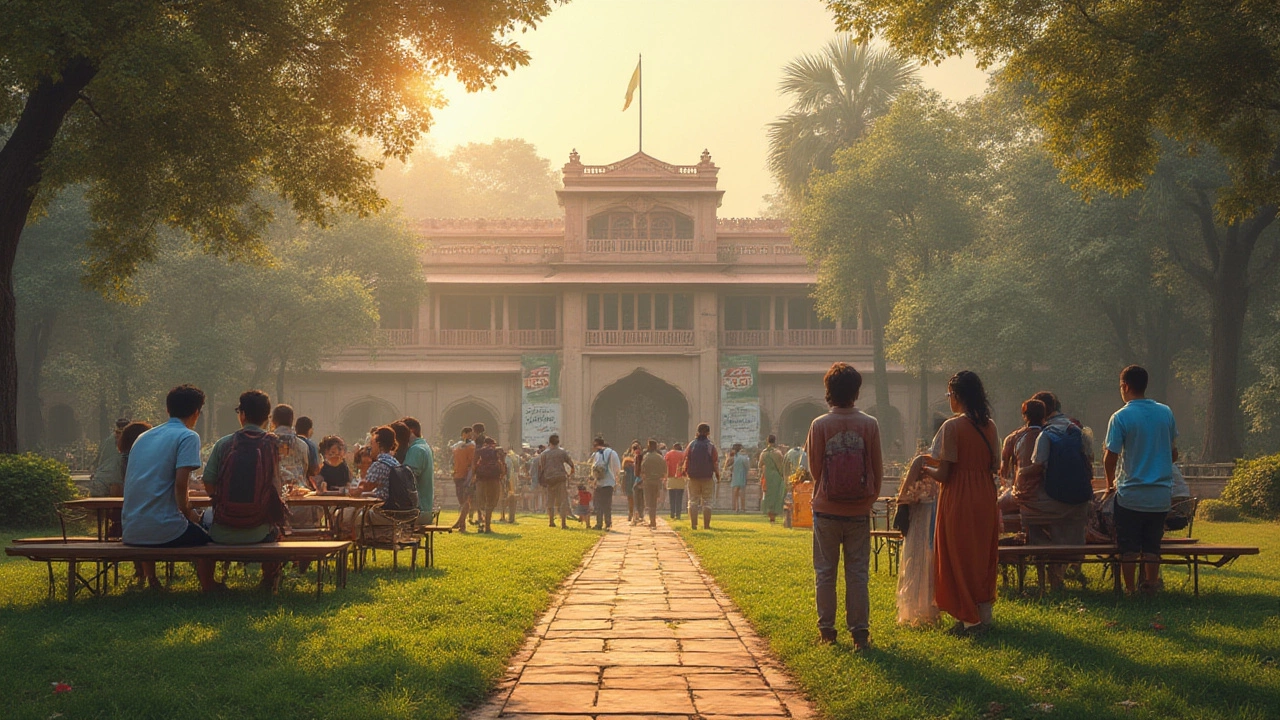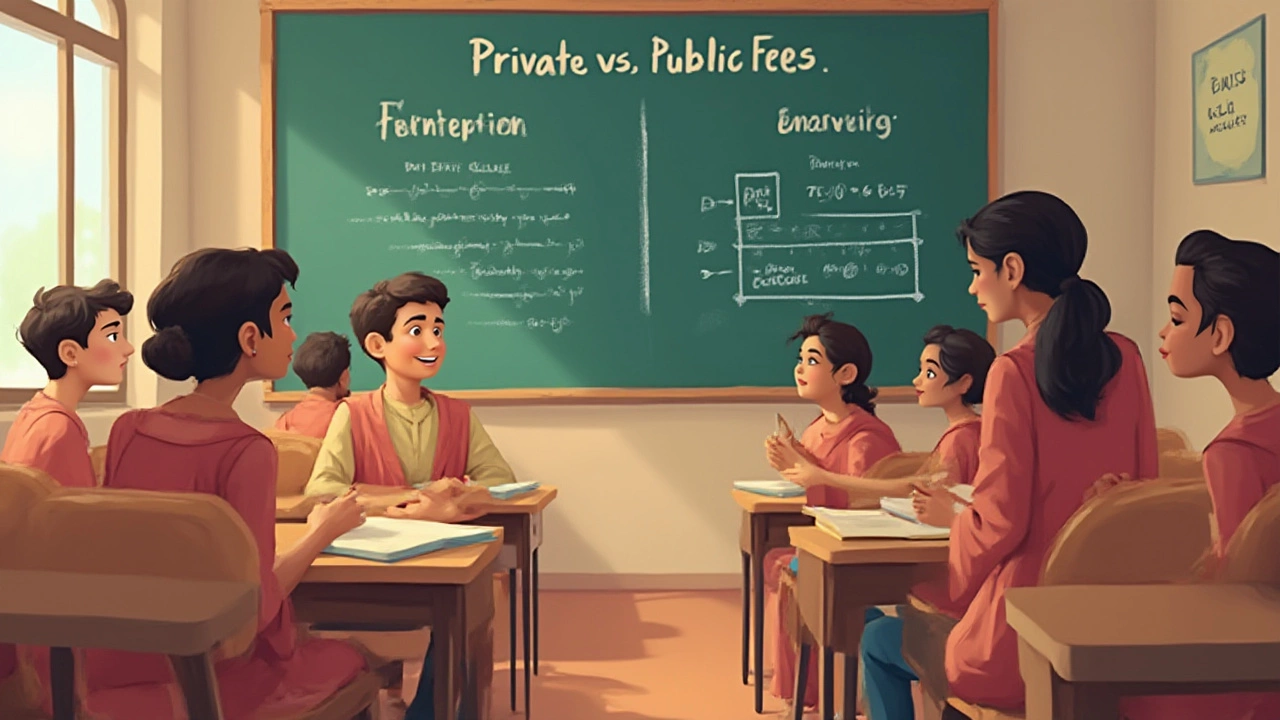
Is BA English Literature actually affordable in India? You’d think a course about books and poetry would cost peanuts compared to engineering or medicine, right? Turns out, you might be in for a surprise—especially if you’re eyeing some of the big-name private colleges or you don’t quite fit the government ‘quota’ molds. Fees for this popular course can swing wildly, depending on where you apply, who manages the college, and sometimes, whether you’re lucky enough to grab a seat on merit. So, what’s the real story behind the numbers? Is it just a case of a few thousand bucks, or could it burn a hole right through your wallet? Let's break it down and see where your money actually goes if you want to study BA English Literature in India.
Why BA English Literature Fees Vary So Much
Universities and colleges across India don’t follow a single price tag when it comes to this course. So don’t expect a fixed rate wherever you go. At central or state government universities, the fees can actually be shockingly low — sometimes not much more than what you’d pay for a mobile phone. Think of old, much-loved names like Delhi University, University of Calcutta, or Jawaharlal Nehru University. Here, you pay for the essentials; they’re funded by state money, so your tuition bill is usually modest—usually in the range of ₹2,000 to ₹11,000 per year in most government colleges as of 2024. That means you can technically study for all three years for what some private colleges charge for one semester.
Step into private territory and the bill transforms. Suddenly, BA English can cost somewhere between ₹40,000 and ₹2,00,000 a year—sometimes more if you’re looking at colleges attached to plush campuses, state-of-the-art auditoriums, and swanky hostels. Places like Christ University (Bangalore), St. Xavier's (Mumbai), or FLAME University (Pune) charge higher fees mainly because they offer extras—workshops, guest lectures, and sometimes, international exposure. These extras are nice, no doubt, but they make a huge difference to your bank account, too.
Don’t forget autonomous colleges—they set their own rules and often price their courses somewhere in the middle. Add to that government quotas or scholarships for reserved categories, and it’s a different cost for nearly every student in the same batch. If you’re an NRI or international student, fees can jump to nearly double or triple, regardless of college type.
Breaking Down Actual Fee Amounts at Top Colleges
Wondering exactly how much you might have to shell out for a BA English degree in India? Here’s some verified data from actual institutions. It’s easier to compare when you see it in black and white:
| College/University | Type | Annual Tuition Fee (2024-25) |
|---|---|---|
| Delhi University (Lady Shri Ram, Miranda House, etc.) | Public (Central) | ₹7,000 – ₹18,000 |
| University of Calcutta (Presidency College) | Public (State) | ₹2,500 – ₹9,000 |
| Jawaharlal Nehru University, New Delhi | Central University | ₹2,350 – ₹7,200 |
| Loyola College, Chennai | Private (Autonomous but Aided) | ₹23,110 – ₹41,200 |
| Christ University, Bangalore | Private (Autonomous) | ₹62,000 – ₹1,41,000 |
| St. Xavier’s College, Mumbai | Private (Autonomous) | ₹25,000 – ₹65,000 |
| FLAME University, Pune | Private (Deemed) | ₹3,20,000 – ₹4,00,000 |
So, if you’re targeting DU, the entire three-year course could cost less than one year at Christ or FLAME. Even within Delhi University, there’s variation. Off-campus colleges like Zakir Husain or PGDAV are cheaper than the famous campus ones. Hostels, extra-curricular, library fees, and examination charges are extra—so plan accordingly.

Hidden Costs You Should Know About
On paper, the fees you see advertised are just the tip of the iceberg. Textbooks and study materials, for example, are rarely included. Price tags here can range from ₹2,000 to ₹6,000 a year, depending on how many classics, anthologies, and critical texts your syllabus demands. Library deposits (refundable, but you still have to cough it up) often start around ₹1,000. Many universities have some sort of annual fest, mandatory excursions, and student union fees—individual bills, but together, they start to add up.
If you’re not a local and housing matters, hostels range from ₹20,000 a year in government colleges to easily ₹60,000 or more in private ones. Factor in food, laundry, and Wi-Fi (yes, Wi-Fi charges are occasionally tacked onto your bill). Examination fees and registration costs sneak up every semester, sometimes ₹1,000 to ₹2,000 each go. Even if you opt for day-scholar status, daily commutes can cost ₹500 to ₹2,000 a month in metros, factoring in buses, metro passes, rickshaws, or just Uber-ing when you’re late (because, let's be real, that happens).
One more thing: English Honours often means seminars, papers, and presentations. Printing and binding projects, making PPTs, or traveling to academic conferences—all these can cost anywhere from ₹1,500 to ₹5,000 a year, especially in top private colleges where competition for the best final thesis feels almost Olympic-level. Add placement training fees in some colleges, and even volunteering activities have ‘hidden’ charges.
Tips for Reducing BA English Literature Education Expenses
Let’s face it: not everyone studying English literature gets handed a silver spoon (or a golden library card). But there are solid tricks to shave off those costs. First, if you’re academically decent, try to grab a merit-based scholarship—almost every reputable university in India offers these, especially for the top scorers or those who bring glory through sports, the arts, or NCC. Do your homework on the college website before applying. The application process can seem like a maze, but with a bit of persistence, you could score a 50% fee waiver—or even get all tuition covered if you hit the right criteria.
There are also government schemes for economically weaker sections (like the National Scholarship Portal and various state-level grants). Caste-based and minority community scholarships exist too, and private organizations like Tata and Inlaks offer support for exceptional students. If you’re disciplined and don’t mind working extra hours, consider campus jobs or internships—editing for the college magazine, library desk, event organizing, or even tutoring juniors. Earnings might range from ₹2,000 to ₹10,000 a month, and those can really cushion those out-of-pocket expenses for books and supplies.
Bargain hunting helps. Buy textbooks second-hand (check campus notice boards, online groups), and resell your own at the course's end. Many students share books, form study groups, or rely on the college library—old-school but still the best way to save cash. Attend the free public lectures and workshops whenever possible. Digital libraries like the National Digital Library of India or Project Gutenberg host a treasure of e-books and critical essays for free. Don't underestimate how much you can save by avoiding living in pricey hostels or PGs—find a group of friends and rent a shared flat. Sometimes the difference in food costs between a private mess and a local dhaba is enough to pay your semester registration each year.

Choosing the Right College: Does High Fee Guarantee Better Value?
A lot of people get caught up thinking, "More expensive means better quality." But when it comes to BA English Literature in India, that's not always true. Sure, private colleges might have fancy auditoriums, international lecturers, and three cafes per building, but what really matters for most employers or postgrad admissions is the name—like, does your degree say Delhi University, Presidency, or Loyola? Reputation often trumps facilities, especially if you're planning to apply for higher studies in the UK or US, where they're familiar with old Indian universities but probably haven't heard of newer, pricier ones.
If you're career-focused, look for colleges that have strong placement records (yes, English grads get jobs in publishing, corporate communications, content writing, etc.), not just fancy amenities. Scrutinize their alumni networks, internship tie-ups, and opportunities for research projects or paper presentations at international conferences. Sometimes, a less expensive college with supportive teachers and a good peer group offers better learning than a glitzy one where you’re just a roll number in a massive auditorium.
Finally, remember to think about the city—a college in a metro might offer more part-time work, but cost more for transport and living. Remote campuses might have lower fees and great focus, but you won’t have as many networking opportunities. Always ask recent students (look for college WhatsApp or Facebook groups) what they paid and whether they thought it was “worth it.” Advice from people who’ve just been through the system can save you serious money and heartbreak down the line.
Whatever path you pick for your BA English Literature journey in India, do your research, watch out for the hidden extras, and remember—sometimes, a good library card and a supportive group of friends can be worth more than all the fancy extras combined.
